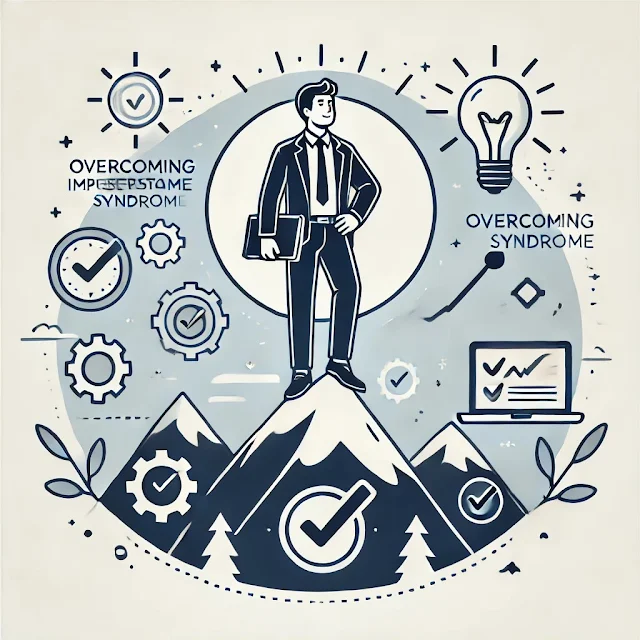How to Overcome Imposter Syndrome as a Freelancer
Introduction
Imposter syndrome is one of the most
silent yet powerful struggles faced by freelancers worldwide.
Whether you’re just beginning your freelance career or have years of experience
under your belt, there may come a time when you feel like a “fraud.” You might
question your own abilities, wonder if you truly deserve success, or fear that
your clients will one day “find out” you’re not as skilled as they think.
This invisible barrier is called imposter
syndrome—a persistent pattern of self-doubt and the belief that your
achievements are merely luck or coincidence, rather than the result of your
hard work and skill.
As Suzy Kassem beautifully
said:
“Doubt kills more dreams than
failure ever will.”
If you’ve ever felt like an imposter
in your own success story, know that you are not alone. Imposter
syndrome is incredibly common among freelancers because they often work
independently, without the structure or feedback of a traditional job.
The good news? You can overcome it.
By recognizing the symptoms, understanding the root causes, and applying
practical strategies, you can rebuild your confidence, silence your inner
critic, and thrive as a freelancer.
Earn Extra Income with These Online Passive Income Ideas
Understanding Imposter Syndrome
Imposter syndrome can manifest in
many different ways. Here are some of the most common symptoms freelancers
experience:
1.
Self-Doubt
Even after delivering successful
projects and receiving great feedback, you might still question whether you’re
truly capable. You might feel like your success was just luck or timing.
2.
Perfectionism
You may believe your work is never
good enough. No matter how much effort you put in, you keep revising
endlessly—afraid to submit your project until it’s “perfect.” This often leads
to burnout and delays.
3.
Attributing Success to Luck
Instead of recognizing your skill
and dedication, you might credit your success to chance—thinking, “I just
got lucky with that client,” or “Anyone could have done it.”
4.
Fear of Being Exposed
Many freelancers fear that clients
will “find out” they’re not as good as they seem. This fear can cause anxiety
and even prevent you from pitching new clients or taking on bigger projects.
5.
Difficulty Accepting Praise
When clients compliment your work,
you might respond with self-deprecating remarks or brush off their
praise—believing you don’t truly deserve it.
Recognizing these signs is the first step toward change. When you can identify your inner critic, you can start taking conscious steps to silence it.
Causes of Imposter Syndrome in Freelancing
Freelancing is a unique career path
that comes with freedom, flexibility, and creativity—but it also comes with
emotional challenges. Let’s explore the main causes behind imposter syndrome
among freelancers:
1.
Lack of External Validation
Unlike traditional employees who
receive feedback, promotions, or performance reviews, freelancers often work in
isolation. Without consistent validation from managers or peers, it’s easy to
question whether you’re doing well.
2.
Constant Comparison
Social media can be both inspiring
and toxic. Seeing other freelancers showcasing their big clients, high
earnings, or creative projects can trigger feelings of inadequacy. You may
start to feel like you’re falling behind, even if your journey is progressing
perfectly well.
3.
Income Uncertainty
Freelancers face unpredictable
income streams. A month full of clients can be followed by a dry spell, leading
to self-doubt. You might start questioning your worth or skill simply because
work is temporarily slow.
4.
New Challenges
Freelancers often take on diverse
projects, each requiring new skills or creativity. While this helps you grow,
stepping into new areas can spark fear of failure or the belief that you’re
“not ready.”
5.
High Standards
Freelancers often set impossibly
high expectations for themselves. You might feel pressure to be a designer,
marketer, and accountant all at once—and when you fall short, self-doubt creeps
in.
Recognizing these causes helps you
realize that imposter syndrome isn’t about being unqualified—it’s about how
your mind interprets your success.
Freelancer’s Guide to Beating Self-Doubt and Imposter Syndrome
Now that we understand the problem, let’s explore powerful, actionable strategies to help you overcome imposter syndrome and regain confidence in your freelance journey.
1.
Recognize and Acknowledge Your Feelings
The first and most essential step is
awareness. Don’t ignore or suppress your feelings—acknowledge them.
Realize that even the most successful freelancers and entrepreneurs have felt
the same way.
When you can identify imposter thoughts (“I don’t deserve this job” or “I’m not good enough”), pause and challenge them. Awareness weakens the power of self-doubt.
2.
Keep a Success Journal
Start maintaining a Success
Journal or “Confidence Log.” Every time you achieve something—big or
small—write it down. Include things like:
- Positive client feedback
- Completed projects
- Skills you’ve learned
- Milestones like your first $1000 month
When you’re feeling uncertain, open your journal and remind yourself of your accomplishments. This simple practice helps rewire your brain to focus on facts rather than fear.
3.
Reframe Negative Thoughts
Your inner critic can be harsh, but
remember: you control the narrative. Replace thoughts like “I’m not
experienced enough” with “Every expert was once a beginner—this is part
of my growth.”
Reframing turns your weaknesses into opportunities for learning. Over time, this mindset shift can completely transform how you view yourself and your work.
4.
Stop Comparing Yourself to Others
Every freelancer’s journey is
unique. Comparing your starting point to someone else’s years of experience is
unfair to yourself.
Social media is a highlight reel—it rarely shows the failures, struggles, or long hours behind success. Focus instead on your own progress. Set goals, track your development, and celebrate personal growth rather than competition.
5.
Seek Support and Community
Isolation often amplifies imposter
syndrome. Joining a freelancer community—whether on Facebook, Reddit,
LinkedIn, or platforms like Upwork—can make a huge difference.
When you connect with like-minded
freelancers, you’ll realize that everyone faces similar doubts. Sharing
experiences, exchanging feedback, and supporting one another builds confidence
and belonging.
6.
Embrace Continuous Learning
One of the best ways to beat
self-doubt is to keep learning. Enroll in online courses, read books, attend
webinars, and sharpen your skills regularly.
The more you learn, the more
equipped you feel to tackle new challenges. Continuous learning transforms fear
into curiosity—and curiosity into confidence.
Remember: “Confidence comes not
from always being right but from not fearing to be wrong.”
The Freelancer’s Guide to Confidence
7.
Accept That Perfection Is Unrealistic
Perfectionism is often the root
cause of imposter syndrome. Many freelancers waste precious time trying to
perfect every pixel, word, or design.
But here’s the truth: perfection is
an illusion. Clients don’t hire you to be flawless—they hire you to deliver
value. Mistakes are part of growth. Learn from them, improve, and move forward.
Instead of striving for perfection,
strive for progress. Small steps forward, taken consistently, build
mastery.
8.
Celebrate Small Wins
Confidence is built through acknowledging
victories, no matter how small. Did you finish a challenging project? Get good
feedback? Send out five proposals today? Celebrate it!
Each success is proof of your effort
and growth. You can reward yourself with something as simple as a break, a
coffee, or sharing your progress with your support group.
Small celebrations reinforce a
positive mindset and remind you that success is not a one-time event—it’s a
continuous journey.
9.
Practice Self-Compassion
Freelancers often hold themselves to
extremely high standards. When things go wrong—a client cancels, a project
fails, or feedback is harsh—you might be quick to blame yourself.
But harsh self-criticism doesn’t
improve performance—it only lowers confidence.
Instead, practice self-compassion.
Talk to yourself as you would to a close friend. Be kind, patient, and
understanding. Remember, freelancing is a journey full of learning curves, not
a race for perfection.
10.
Seek Professional Help if Needed
If imposter syndrome starts to
affect your productivity, motivation, or mental health, don’t hesitate to seek
help.
A therapist, career coach,
or mentor can provide practical tools and emotional support. Sometimes
an external perspective helps you see your strengths more clearly and break
free from self-doubt patterns.
There’s no shame in seeking
help—it’s a sign of strength and self-awareness.
The Freelancer’s Guide to Confidence
Confidence doesn’t come
overnight—it’s built through consistent effort, experience, and reflection.
Here are a few additional tips to maintain your confidence over time:
- Track your progress monthly. See how far you’ve come in skills, income, and client
satisfaction.
- Invest in your brand.
A professional portfolio, updated LinkedIn, or personal website builds
credibility and confidence.
- Surround yourself with positivity. Follow creators and mentors who uplift and inspire
you, not those who make you feel inadequate.
- Give back.
Teach or mentor newer freelancers—it’s one of the fastest ways to realize
how much you’ve learned.
Conclusion
“The worst enemy to creativity is
self-doubt.” – Sylvia Plath
Imposter syndrome can feel
overwhelming, but it’s not permanent. By confronting your fears, celebrating
your growth, and embracing imperfection, you can silence your inner critic and
step fully into your potential.
Every freelancer has moments of
doubt, but what separates the successful from the stuck is action—the
courage to keep moving forward even when you don’t feel “ready.”
You deserve your success. Your
clients hire you for a reason. Trust your skills, honor your journey, and
remember: you are enough.
So, the next time imposter syndrome
whispers that you’re not good enough—smile, take a deep breath, and prove it
wrong. 💪
FAQs
1.
What are some signs of imposter syndrome?
Common signs include doubting your
abilities, attributing success to luck, fearing exposure as a fraud,
overworking to “prove” yourself, and dismissing praise from clients or peers.
2.
How can freelancers gain more confidence?
Keep a success journal, join
freelancer communities, learn continuously, and remind yourself of your value.
Confidence grows when you take consistent action, not when you wait for
validation.
3.
Does imposter syndrome ever go away completely?
For most people, it lessens with
experience—but may reappear during major career transitions or challenges. The
key is to manage it effectively through awareness and mindset shifts.
Final Thoughts
Do you struggle with imposter
syndrome as a freelancer? Share your experiences in the comments and let’s
support each other in overcoming self-doubt.
👉 Don’t forget to
subscribe for more freelancing insights, download our free Confidence
Booster Guide, and join our freelance community to connect with like-minded
professionals.
If you found this helpful, share
it with fellow freelancers and spread positivity. Let’s build a world where
freelancers feel confident, capable, and unstoppable! 🚀
Do you struggle with imposter syndrome as a freelancer? Share your experiences in the comments below! Don’t forget to subscribe to our YouTube channel EmpowerHub) and Mastering The Freelance IT Blog for more freelancing tips and motivation.






.png)











0 Comments